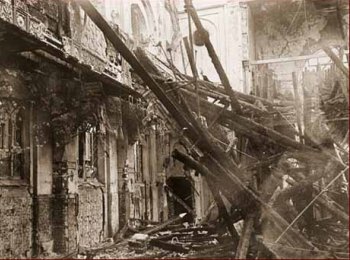| | 09 November, 2008
| | Not Kristallnacht but what followed that brought about ‘final solution,’ says Hebrew University professor | |
 | | Kristallnacht in Germany 1938 |
|
It is not Kristallnacht but what was decided in its wake that launched the series of especially draconian measures against the Jews of Germany, a Hebrew University of Jerusalem professor contends in a new book that has just been published in connection with the 70th anniversary of Kristallnacht.
The book, “Deutsche Gegen Deutsche” (Germans Against Germans: The Fate of the Jews 1938-1945”) by Moshe Zimmermann, the Richard Michael Koebner Professor of German History at the Hebrew University of Jerusalem, has been published in German by the Aufbau publishing house in Berlin and deals with the fate of the Jews of Germany, beginning with the pogrom of Kristallnacht (also known as The Night of Broken Glass), which occurred on Nov. 9-10, 1938. On that night synagogues and Jewish owned businesses were burned and looted across Germany, and Jews were murdered or arrested and sent to concentration camps. The book traces what happened to the Jews of Germany from that event until the war ended in 1945.
Prof. Zimmermann said that “the book was written as a reaction to the minimal dealing with what occurred specifically regarding the Jews of Germany, in contrast to the flood of books regarding the Holocaust against the Jewish people in general.”
The book relates among other things that, in contrast to what is usually said, Kristallnacht was not a “general rehearsal” for the Holocaust, but was in fact a deviance from Nazi operations until that point, which were expressed in oppression of German Jews in ways which, supposedly, were legal and socially acceptable.
“Three days after the pogrom, a conference was held of the top leadership of the Nazi regime, with Hitler’s blessing, where criticism was actually expressed about the pogrom,” said Prof. Zimmermann. “As opposed to this,” he said, “the participants discussed what was called ‘the final solution to the Jewish problem in Germany;’ that is, the legal and economic efforts to get rid of the Jews of Germany. From that point, and not the Kristallnacht pogrom itself, the way was cleared for the establishment of ghettos, the wearing of the yellow star, and for expulsion and murder.”
One of the biggest problems dealt with in the book is the extent of the cooperation of the victims with the German rulers in paving the way for the Jews’ own repression and destruction. In the words of Prof. Zimmermann, “The attempt towards rescue and survival to the extent possible created a forced cooperation between the Jewish leadership and the Nazi regime. The efforts by the Jews to save their own skins or that of their families brought about, at a later stage, actual activity in the service of the Gestapo.”
Prof. Zimmermann adds, “As far as those people are concerned, the question of ‘don’t judge a person until you are in their shoes’ is a difficult one.”
|
Downloadable File: krystallnacht.doc |
|


